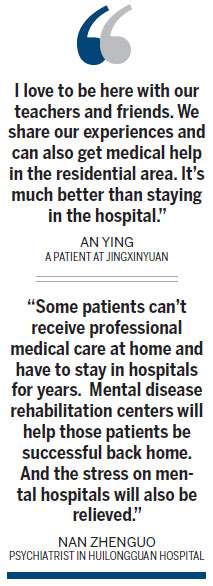Mental healthcare emerges from the shadows
Updated: 2012-02-03 09:44
By Yang Wanli and Wu Wencong (China Daily)
|
||||||||
Busy, and paid less

At 10 am on a Monday in January, some patients were taking a walk outside Huilongguan Hospital, in Changping district. Their blue and white pajamas peeked out from their winter coats, identifying them as patients.
Wang Mei, one of the nurses in charge of the group, was preparing for a clay-modeling class that would start when her patients returned inside. "Our section has 62 patients right now. Compared with nurses in general hospitals, we bear more mental stress. Only three nurses for night duty, but we should take care of about 60 patients," she said.
Nurses are responsible for all of a patient's daily needs, including bathing, combing hair and trimming fingernails. Despite such regular and close contact, they sometimes face physical risks.
Wang said a male patient once grasped her throat, and she couldn't breathe. "I was scared at the very beginning, but soon calmed down and pressed an alarm ring. A security guard saved me," she said. "Not all nurses can bear that."
Yang, the hospital president, said about one-third of nurses quit every year. Psychiatrists are paid less than physicians in general hospitals. "They earn half but do more work," Yang said. "Because of that, fewer students choose to learn psychiatry, and some medical colleges have even canceled the subject."
China's CDC has no specific information on the colleges or number of medical students, but did say the country has about 20,000 psychiatrists and that at least 56 million people need treatment for mental illness but never receive it.
Transition, guidance
While more mental patients are seeking professional help from psychiatrists, psychologists and the like, leaving the hospital poses its own problems.
"Some patients can't receive professional medical care at home and have to stay in hospitals for years," said Nan Zhenguo, a psychiatrist in Huilongguan Hospital. "Mental disease rehabilitation centers will help those patients be successful back home. And the stress on mental hospitals will also be relieved."
He said that rehabilitation therapy centers have been widely promoted in Western countries as the best way to help mental patients lead normal lives. "But in China, they are still underdeveloped," he said. Jingxinyuan is the country's only such center with the assistance of psychiatrists.

 Relief reaches isolated village
Relief reaches isolated village
 Rainfall poses new threats to quake-hit region
Rainfall poses new threats to quake-hit region
 Funerals begin for Boston bombing victims
Funerals begin for Boston bombing victims
 Quake takeaway from China's Air Force
Quake takeaway from China's Air Force
 Obama celebrates young inventors at science fair
Obama celebrates young inventors at science fair
 Earth Day marked around the world
Earth Day marked around the world
 Volunteer team helping students find sense of normalcy
Volunteer team helping students find sense of normalcy
 Ethnic groups quick to join rescue efforts
Ethnic groups quick to join rescue efforts
Most Viewed
Editor's Picks

|

|

|

|

|

|
Today's Top News
Health new priority for quake zone
Xi meets US top military officer
Japan's boats driven out of Diaoyu
China mulls online shopping legislation
Bird flu death toll rises to 22
Putin appoints new ambassador to China
Japanese ships blocked from Diaoyu Islands
Inspired by Guan, more Chinese pick up golf
US Weekly

|

|






